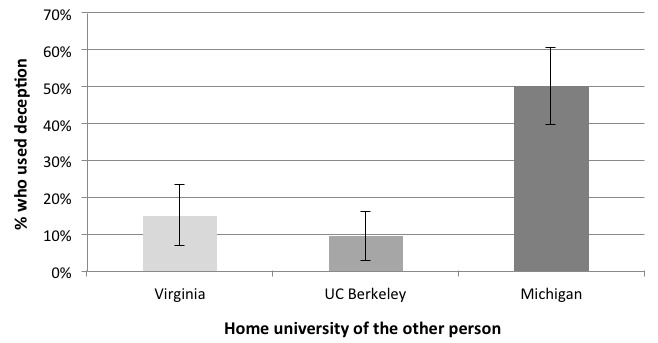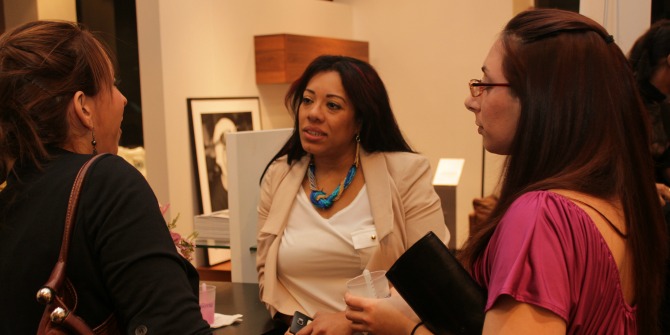 Rivalry, by DrMiaow, own work, CC BY-SA 4.0, via Wikimedia Commons
Rivalry, by DrMiaow, own work, CC BY-SA 4.0, via Wikimedia Commons
Rivalry is a competitive relationship that is built up over repeated and evenly-matched competition. There are many famous examples of rivalries gone awry. Many people still vividly remember the brutal sabotage attempt launched by Tonya Harding’s ex-husband against her rival Nancy Kerrigan in the 1994 Winter Olympics. Fewer may know that Thomas Edison and his right-hand man Harold Brown staged savage public electrocutions of animals in an attempt to spread fear over alternating current (AC), the form of electricity being promoted by Edison’s rival, Nikola Tesla. Examples of rivalry turned ugly are also prevalent in business, such as the ‘Dirty Tricks’ campaign launched by British Airways against Virgin Atlantic, which included stealing Virgin’s customer data and then lying to Virgin customers about their flights being canceled.
Despite all this anecdotal evidence, social scientists have not historically made any distinction between rivalry and mere competition. Nor had the link between rivalry and unethical behaviour been explored prior to our work. We consider rivalry to be a more personal form of competition in which a longstanding competitive relationship exists between the competitors. That is, rivals have a history with one another – and this history can magnify the psychological stakes of competition.
In this research, we sought to establish that rivalry can indeed increase behaviours such as lying, cheating, and sabotage, and to explore the psychological factors that explain why this happens. We conducted four studies to examine these questions. We found that games between rivals in Italy’s top football league, Serie A, were characterised by higher numbers of offences worthy of yellow and red card penalties (such as dangerous tackles or attempts to deceive the referee). We also found that students attending the Ohio State University were four times as likely to lie to students at the University of Michigan, Ohio State’s primary rival, as they were to lie to students from comparable, non-rival, institutions (the University of Virginia and the University of California, Berkeley).
Figure 1. Ohio State University students behaviour toward their rival University of Michigan students, and also toward students from two non-rival universities

We then sought to explore some of the psychological reasons for why rivalry tends to turn ugly. We surveyed a large sample of working adults about the personal rivals that they have at work, in sports, and in other domains. The results of this survey were clear – people care that much more about winning against their rivals, for two main reasons. First, it turns out that people’s self-esteem is much more contingent upon their performance against their rivals than it is upon their performance against other, non-rival opponents. Second, people care significantly more about their social status – the extent to which others admire and respect them – vis-à-vis their rivals. For these reasons, competition against a rival invokes a ‘win at all costs’ mindset, which is much less pronounced during competition against a non-rival, such as an acquaintance or a new competitor.
Thus, rivalry does indeed have a dark side, and it is based in the fact that the psychological stakes of competition against rivals are amplified. Our prior work has shown that rivalry can also promote greater motivation and performance on effort-based tasks, so it truly seems to be a double-edged sword. These findings carry significant implications for businesses and managers. Many offices have incentive systems in place that explicitly pit employees against one another, often repeatedly. These are exactly the types of conditions that can breed rivalry – which could indeed increase worker motivation, but could also lead to all sorts of disastrous behaviors such as falsifying outcomes (sales, accounting, etc.) and sabotaging fellow employees. Thus managers should be very wary of whether rivalries are forming, and perhaps try to minimize the number of times that two employees are directly in competition with one another. This should be especially true for jobs in which employees have more autonomy to act upon their competitive impulses.
Furthermore, in follow-up work that is still in progress, we are observing that rivalry is so powerful that even just thinking about a personal rival can be enough to increase someone’s Machiavellian tendencies and willingness to lie to get ahead. That is, exposure to one’s rivals – such as seeing a Facebook post from a high school rival, or reading a news article about a rival company – may be all that is needed to spark a ‘win at all costs’ mindset; head-to-head competition with a rival is not needed. This suggests that the influence of rivalry over behavior and decisions is likely to be more widespread than our initial work might have suggested.
♣♣♣
Notes:
- This blog post is based on the authors’ paper, Whatever It Takes to Win: Rivalry Increases Unethical Behavior, co-authored with J. James Reade, in Academy of Management Journal, October 1, 2016 vol. 59 no. 5 1508-1534
- This post gives the views of the authors, not the position of LSE Business Review or the London School of Economics.
- Before commenting, please read our Comment Policy.
 Gavin J. Kilduff (gkilduff@stern.nyu.edu) is an associate professor in the Management and Organizations department at the Stern School of Business at New York University. He received his Ph.D. from the University of California, Berkeley. His teaches negotiation and management classes, and his research focuses on competition and rivalry, status dynamics and hierarchy, relationships and negotiation.
Gavin J. Kilduff (gkilduff@stern.nyu.edu) is an associate professor in the Management and Organizations department at the Stern School of Business at New York University. He received his Ph.D. from the University of California, Berkeley. His teaches negotiation and management classes, and his research focuses on competition and rivalry, status dynamics and hierarchy, relationships and negotiation.
 Adam Galinsky is the chair of the Management Division and the Vikram S. Pandit Professor of Business at the Columbia Business School. He has published more than 200 scientific articles and his research has received numerous national and international awards from the scientific community. He co-authored the critically acclaimed and best-selling book, Friend & Foe (Penguin Random House, 2015). He is the Associate Producer on two documentaries that were each short-listed (final 15) for Best Documentary at the Academy Awards. He has served as a legal expert in multiple lawsuits, producing nationally recognized awards for his clients.
Adam Galinsky is the chair of the Management Division and the Vikram S. Pandit Professor of Business at the Columbia Business School. He has published more than 200 scientific articles and his research has received numerous national and international awards from the scientific community. He co-authored the critically acclaimed and best-selling book, Friend & Foe (Penguin Random House, 2015). He is the Associate Producer on two documentaries that were each short-listed (final 15) for Best Documentary at the Academy Awards. He has served as a legal expert in multiple lawsuits, producing nationally recognized awards for his clients.
 Edoardo Gallo is a University Lecturer (Assistant Professor) in Economics at the University of Cambridge and an Official Fellow at Queens’ College. He is also a Fellow at the Cambridge Endowment for Research in Finance and an Associate Member at Nuffield College. He has a PhD and an MPhil in Economics from the University of Oxford and a BA in Physics and Mathematics from Harvard University.
Edoardo Gallo is a University Lecturer (Assistant Professor) in Economics at the University of Cambridge and an Official Fellow at Queens’ College. He is also a Fellow at the Cambridge Endowment for Research in Finance and an Associate Member at Nuffield College. He has a PhD and an MPhil in Economics from the University of Oxford and a BA in Physics and Mathematics from Harvard University.





